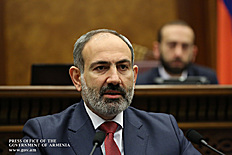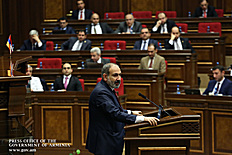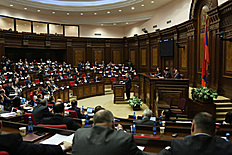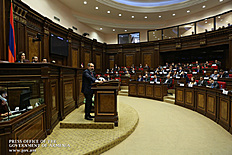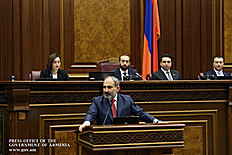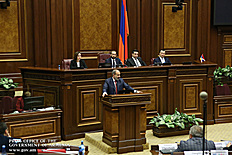Statements and messages of the Prime Minister of RA
Prime Minister Nikol Pashinyan answered a question asked by Arman Babajanyan concerning the Nagorno-Karabakh conflict during the discussion of the report on the process and results of the RA Government program implementation
more 3 photos
Prime Minister Nikol Pashinyan answered a question asked by Arman Babajanyan, a member of the Lusavor Hayastan (Bright Armenia) faction, concerning the Nagorno-Karabakh conflict during the discussion of the report on the process and results of the RA Government program implementation.
Arman Babajanyan, Bright Armenia faction - Mr. Prime Minister, at the March 12 joint sitting of the Security Councils of the Republic of Armenia and the Republic of Artsakh in Stepanakert, you said literally that “in recent years the Madrid Principles have given rise to different interpretations, therefore the most important goal of the upcoming round of negotiations should be to clarify the so-called main concepts, 3 principles and 6 elements.”
Is there any interpretation of said 3 principles and 6 elements, any clarification that can be acceptable to the Armenian side?
After all, we understand that until 2007, when a consensus was reached in Madrid, all the scenarios discussed were exclusively based on the principle of territorial integrity.
Prime Minister Nikol Pashinyan - Thank you for the question. Of course, there may be many interpretations acceptable for the Armenian side. As long as we have seen such interpretations, there is no point in talking about their acceptability. I would like to highlight this emphasis for both the negotiating sides and those involved in the negotiation process.
What are we doing to this end? Are we doing our best to tackle the problem or not? If we do that, the problem is that we need to base the process on the basis of which there is a consensus on the scope of interpretations. That is, if we do not understand each other, then the conversation will never come to an end.
And there will always be misunderstandings and misinterpretations. I said that I want to get some information or our partners’ comments on the background history of the negotiation process.
We have repeatedly faced a situation when following the talks, the representative of Armenia and Azerbaijan made contradictory statements, different from the co-chairs’ comments, in general, and so on. In other words, how come people say different things after negotiating for a few hours? Here is a methodological problem. I want to call on our partners to make it clear that we are talking about the same thing and not about different things.
Indeed, I have important queries to voice about the aforementioned 3 principles and 6 components. But I shall not make them public now, two days before the upcoming negotiations. I will make ask those questions on the spot, and of course, I will tell you my impressions after the talks.
Arman Babajanyan, Bright Armenia faction - Mr. Prime Minister, as far back as in 2007, the Madrid principles were considered to be a success for Armenia because, as I mentioned above, all the documents discussed before that implied the maintenance of territorial integrity. Is it possible that given today’s geopolitical realities, we should put aside these principles and start discussing other principles?
Finally, for example, this recognition of the Golan Heights by the United States undermined the status quo, and the Middle East is facing a mess in this respect. In other words, experts note that it can be deemed as a precedent or Artsakh, too.
Prime Minister Nikol Pashinyan - The answer to this question was made clear in my remarks delivered in Stepanakert this March 12. I clearly stated that the comments made to that effect are important because Azerbaijan’s interpretations of those principles are unacceptable to us. If we see that the Madrid principles are being interpreted that way, we will not accept them. But we can see that the Co-Chairs themselves say that Azerbaijan is wrong.
As long as I have not heard the Co-Chairs’ statements, how can I say that those principles are acceptable or not? The point is that in 2007, they were interpreted as acceptable for us. I say let him comment on them who has proposed these principles. I personally have some queries about it. And then, when responding to these questions, we should not only say whether it is acceptable or not, but either Azerbaijan should say whether it is acceptable or not, because the comments should be agreed upon. This is the whole problem.
Even if interpreted broadly, the Madrid principles should be limited to a specific scope of ideas; otherwise it does not make sense to formulate these principles at all.
